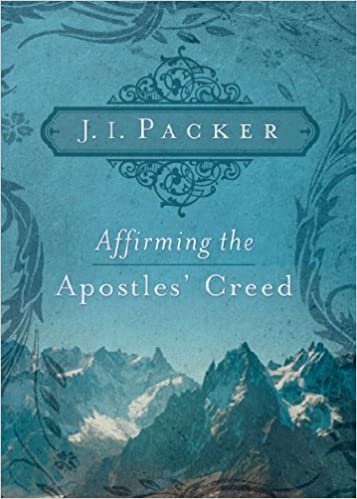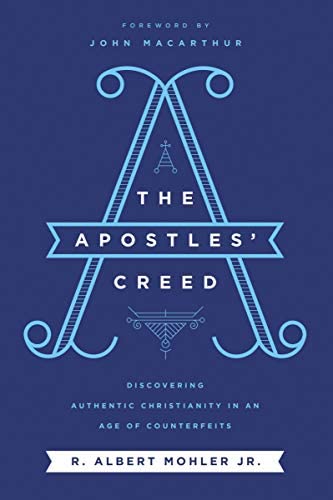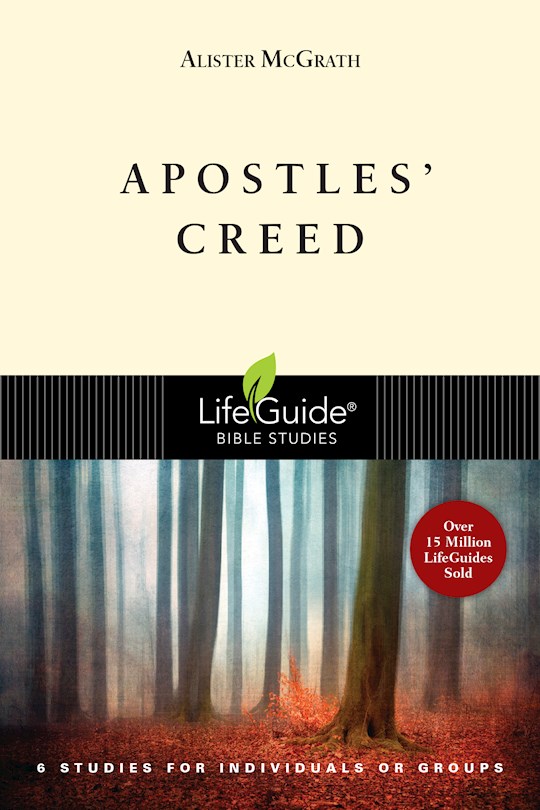Click here to return to Blog Post Intro
The Apostles’ Creed: A Guide to the Ancient Catechism by Ben Myers

God the Father
Jesus relates to God as His own Father and invites His followers to share in the same relationship. He calls God “my Father and your Father” (John 20:17) and “your heavenly Father” (Matthew 6:14). We speak to God, and God listens to us as if we were Jesus.
Early Christian teachers differentiated the God of the gospel from the gods of Greek and Roman culture. The pagan gods are many, but the God of Israel is One. The pagan gods fly into a rage, but the true God is unchangeable and therefore totally reliable. The pagan gods arbitrarily turn against human beings, but the true God consistently seeks our good. There was even a special word for this in early Christian teaching: God’s philanthropia (literally “love of humanity”).
At the end of the fourth century, Gregory of Nazianzus explained that the words “Father” and “Son” should be used without any “bodily ideas” in our minds. Otherwise, we would be back in paganism, imagining a God who physically procreated in order to bring forth a son. We use the words “Father” and “Son,” Gregory says, “in a more elevated sense.”
What then does the word “Father” mean? For Christians, the word describes a relationship and nothing more.
Almighty
God’s power is not only above us but also alongside us, beneath us, and within us. It is not the power of subjection and control but a power that frees and enables. Augustine described the power as “maternal love, expressing itself as weakness.” The early Christians often compared God to a breastfeeding mother, noting that we relate to God like infants drawing nourishment from a mother.
We could not really trust in God if God’s power were limited, sporadic, or unpredictable. If God’s power were just one power among others—if God were “mighty” but not “almighty”—then divine power would end up being another form of manipulation or control.
In the creed, we confess three great movements of God’s power:
- God lovingly brought the world into being;
- God lovingly entered the womb and became part of the world in Jesus Christ; and
- God the Holy Spirit is lovingly transfiguring the world in the lives of the saints.
The world lives because of God’s gentle but all-embracing power, and we are free because of it.
Maker of Heaven and Earth
In the second century, gnostics taught that the physical world was created by an inferior deity. The Christian baptismal confession developed, in part, in response to such world-denying doctrines.
Though many evil things happen in this world, Christians confess that we are still living in God’s good creation. It is a sick world that needs healing, not an evil world that needs destruction. That is the difference between Christianity and Gnosticism.
Affirming the Apostles’ Creed by J. I. Packer

Today, there is a debate and divide between those who say “I believe in God” and those who claim atheism. In the Bible, the great divide was between those who believed in the Christian God and those who served idols—or “gods,” whose metal or mental images did not square with the self-disclosure of the Creator.
Scripture used at least three different references for God’s Name:
- Jehovah (or Yahweh) is God’s “proper name”, given to Moses as the burning bush (Exodus 3:13 and Exodus 6:3). The name means “I am who I am” or “I will be what I will be,” declaring God’s almightiness.
- God “proclaimed the name of the Lord” to Moses by delineating his moral character—“a God merciful and gracious, slow to anger, and abounding in steadfast love and faithfulness, keeping steadfast love for thousands, forgiving iniquity…but who will by no means clear the guilty” (Exodus 34:5-7). This name discloses both God’s nature and his role.
- The Son of God told his disciples to baptize “in the name of the Father and of the Son and of the Holy Spirit” (Matthew 28:19). “Name,” note, not “names”: the three persons together constitute one God. How the eternal God is eternally both singular and plural, how Father, Son, and Spirit are personally distinct yet essentially one is more than we can know or explain.
The Father Almighty
Have we not all one Father? Has not one God created us? – Malachi 2:10
The adjective almighty points to the basic Bible fact that God is the Lord, the King, the omnipotent one who reigns over his world.
God’s loving fatherhood of His eternal Son is both the archetype of His gracious relationship with His own redeemed people and the model from which derives the parenthood that God has created in human families.
Paul spoke of “the God and Father of our Lord Jesus Christ” as “the Father, from whom every family in heaven and on earth is named” (Ephesians 1:3; 3:14).
Does the existence of evil—moral badness, useless pain, and waste of good—suggest that God the Father is not almighty after all? Absolutely, not! Through Christ, bad folk like you and me are already being made good; new pain- and disease-free bodies are on the way, and a reconstructed cosmos with them; and Paul assures us that “the sufferings of this present time are not worth comparing with the glory that is to be revealed to us” (Romans 8:18-23). If God moves more slowly than we wish in clearing evil out of this world and introducing the new order, that, we may be sure, is in order to widen his gracious purpose and include in it more victims of the world’s evil than otherwise he could have done (2 Peter 3:3-10).

The truth of God’s almightiness in creation, providence, and grace is the basis of all our trust, peace, and joy in God, and the safeguard of all our hopes of answered prayer, present protection, and final salvation.
Maker of Heaven and Earth
In 1 Timothy 4:4, Paul says, “For everything created by God is good, and nothing is to be rejected if it is received with thanksgiving.”
The Bible begins, “In the beginning, God created the heavens and the earth.” Packer notes that “the heavens and the earth” is Bible language for “everything that is.”
The Creator-creature distinction is basic to the Bible’s view of God’s lordship and its importance is at least threefold in that it:
- Stops misunderstanding of God. God made us in His image, but we tend to think of him in ours! Voltaire once quipped, “Man made God in his own image”! God does not exist by our will and for our pleasure. As creatures, we are limited, but the Creator is not. Therefore, we find him incomprehensible.
- Stops misunderstanding of the world. The world exists in its present stable state by the will and power of its Maker. We serve God by using and enjoying temporal things gratefully, with a sense of their value to Him, their Maker, and of His generosity in giving them to us.
- Stops misunderstanding of ourselves. As man is not his own maker, so he may not think of himself as his own master. “God made me for himself, to serve him here.” God’s claim on us is the first fact of life that we must face, and we need a healthy sense of our creaturehood to keep us facing it.
The Apostles’ Creed: Discovering Authentic Christianity in an Age of Counterfeits by R. Albert Mohler, Jr.

God has revealed Himself in both nature and Scripture.
A.W. Tozer brilliantly summarized the entirety of Christian discipleship.
From the time of the apostles onward, the church has taken its stand on the phrase, Credo in Deum Patrem Omnipotentem: I believe in God, the Father Almighty. Notice, the Apostles’ Creed describes both the identity and character of God.
As evangelical theologian Carl F.H. Henry so beautifully explained, God loves us so much that “He forfeits His own personal privacy that His creatures might know Him.”
Our Father: A Personal God
God is not a force or a principle or a “higher power.” He has instead revealed himself as the Father of our Lord Jesus Christ (Ephesians 1:3).

David described God as a “Father of the fatherless” then Jesus as “the Son,” had a unique relationship with the Father.
The Baptist Faith & Message affirms: “God as Father reigns with providential care over His universe, His creatures, and the flow of the stream of human history according to the purposes of His grace. He is all powerful, all knowing, all loving, and all wise. God is Father in truth to those who become children of God through faith in Jesus Christ. He is fatherly in His attitude toward all men.”
The Father Almighty
Just as God is personal, he is also all-powerful. God is immanent, but he is also transcendent. As Scripture indicates, God is El Shaddai, the God who is all-powerful (Genesis 17:1).
In the Apostles’ Creed the word Almighty is a collective that is meant to represent all God’s attributes, the fullness of God’s perfections. All God’s attributes—omnipotence, omniscience, omnipresence, self-existence, and immutability—are summed up in this one word, Almighty.
Maker of Heaven and Earth
Christians believe that everything that exists traces its existence and its reality to the sovereign act of God the Father Almighty—maker of heaven and earth.
Genesis 1:1 establishes these central and essential truths about God:
- God is eternal, existing prior to creation.
- God is infinite, not bound by the heavens and the earth.
- God is omnipotent, speaking creation into existence.
- God is independent, not relying on anything in creation.
Echoing the creation narrative of Genesis, John began his gospel with “in the beginning was the Word, and the Word was with God, and the Word was God. He was in the beginning with God. All things came into being through Him, and apart from Him nothing came into being that has come into being” (John 1:1-3). John’s concise yet profound theology explains how God created with the same Word by which he redeems us. God’s Word spoke all things into existence, and God’s Word took on human flesh to redeem his people.
God’s provision is summarized in the first article of Luther’s Small Catechism of 1529: “I believe that God has created me and all that exists; that he has given me and still sustains my body and soul, all my limbs and senses, my reason and all the faculties of my mind, together with food and clothing, house and home, family and property; that he provides me daily and abundantly with all the necessities of life, protects me from all danger, and preserves me from all evil.”
Apostles’ Creed by Alister McGrath

Do you not know?
Have you not heard?
Has it not been told you from the beginning?
Have you not understood since the earth was founded?
He sits enthroned above the circle of the earth,
and its people are like grasshoppers.
He stretches out the heavens like a canopy,
and spreads them out like a tent to live in.
He brings princes to naught
and reduces the rulers of this world to nothing.
No sooner are they planted,
no sooner are they sown,
no sooner do they take root in the ground,
than he blows on them and they wither,
and a whirlwind sweeps them away like chaff.“To whom will you compare me?
Or who is my equal?” says the Holy One.
Lift up your eyes and look to the heavens:
Who created all these?
He who brings out the starry host one by one
and calls forth each of them by name.
Because of his great power and mighty strength,
not one of them is missing.Why do you complain, Jacob?
Isaiah 40:21-31
Why do you say, Israel,
“My way is hidden from the Lord;
my cause is disregarded by my God”?
Do you not know?
Have you not heard?
The Lord is the everlasting God,
the Creator of the ends of the earth.
He will not grow tired or weary,
and his understanding no one can fathom.
He gives strength to the weary
and increases the power of the weak.
Even youths grow tired and weary,
and young men stumble and fall;
but those who hope in the Lord
will renew their strength.
They will soar on wings like eagles;
they will run and not grow weary,
they will walk and not be faint.
The statement “God is our Father” means that God is like a human father. Like all analogies, the analogy of God as Father breaks down at points. However, it is still an extremely useful and vivid way of thinking of God.
Any idea of God as an impersonal being or force is immediately discounted when we speak of God as Father. Everything we see in the world was created by God and belongs to God. The universe reflects the wisdom, power and majesty of the God who brought it into being.
As you worship God the Father Almighty, Creator of Heaven & Earth, take some time tonight to gaze at the night sky, or if there is too much light in your area to see the stars, look at other aspects of your natural surroundings in the daytime. Even the most urban setting offers opportunities to see clouds, sunsets, and green plants.



